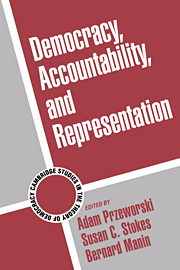Book contents
- Frontmatter
- Contents
- List of Contributors
- Introduction
- Part One Elections, Accountability, and Representation
- 1 Elections and Representation
- 2 Electoral Accountability and the Control of Politicians: Selecting Good Types versus Sanctioning Poor Performance
- 3 What Do Policy Switches Tell Us about Democracy?
- 4 Accountability and Authority: Toward a Theory of Political Accountability
- 5 Accountability and Manipulation
- 6 Party Government and Responsiveness
- 7 Democracy, Elections, and Accountability for Economic Outcomes
- Part Two The Structure of Government and Accountability
- Part Three Overview
- Author Index
- Subject Index
7 - Democracy, Elections, and Accountability for Economic Outcomes
Published online by Cambridge University Press: 05 June 2012
- Frontmatter
- Contents
- List of Contributors
- Introduction
- Part One Elections, Accountability, and Representation
- 1 Elections and Representation
- 2 Electoral Accountability and the Control of Politicians: Selecting Good Types versus Sanctioning Poor Performance
- 3 What Do Policy Switches Tell Us about Democracy?
- 4 Accountability and Authority: Toward a Theory of Political Accountability
- 5 Accountability and Manipulation
- 6 Party Government and Responsiveness
- 7 Democracy, Elections, and Accountability for Economic Outcomes
- Part Two The Structure of Government and Accountability
- Part Three Overview
- Author Index
- Subject Index
Summary
Our purpose is to examine the empirical validity of two propositions: that democracy is a political regime distinguished by the accountability of rulers to the ruled, and that elections are the mechanism through which this accountability is enforced. These propositions are obviously related: the first follows from the second one by the definition of democracy as a regime in which rulers are selected by elections. Hence, the structure of the argument we intend to examine is that (1) democracy is a system that enforces accountability (empirical hypothesis), because (2) democracy is a regime in which rulers are chosen by elections (definition), and (3) accountability is enforced by elections (empirical hypothesis). If all of this appears pedantic, hold on.
We begin by spelling out our criteria for classifying political regimes, distinguishing different types of democracy and dictatorship, and providing some background information about their incidence. After we analyze statistically the impact of economic conditions on the survival of heads of governments, we study how rulers are selected under different forms of democracy and focus on the role of elections as a mechanism of accountability. A brief conclusion, mainly a list of doubts, closes the chapter.
Political Regimes
We classify as democracies regimes that during a particular year simultaneously satisfy four criteria: (1) the chief executive is elected (directly or indirectly), (2) the legislature is elected, (3) more than one party competes in elections, (4) incumbent parties have in the past or will have in the future lost an election and yielded office.
- Type
- Chapter
- Information
- Democracy, Accountability, and Representation , pp. 222 - 250Publisher: Cambridge University PressPrint publication year: 1999
- 54
- Cited by



